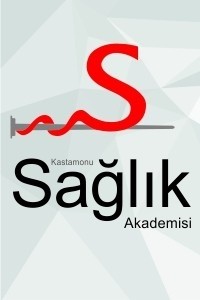Hemşirelik Öğrencilerinde Stresle İlgili Faktörlerin Değerlendirilmesi
Stres, Hemşirelik Öğrencileri, Hemşirelik Eğitimi, Stresörler
Evaluation of Factors Related to Stress Among Nursing Students
Stress, Nursing Students, Nursing Education, Stressors,
___
- Admi, H., Moshe-Eilon, Y., Sharon, D. & Mann, M. (2018). Nursing students' stress and satisfaction in clinical practice along different stages: A cross-sectional study. Nurse Education Today, 68:86–92.
- Ahmed, W. A. & Mohammed, B. M. (2019). Nursing students’ stress and coping strategies during clinical training in KSA. Journal of Taibah University for Science, 14(2):116–122.
- Alatawi, A. O., Morsy, N. M. & Sharif, L. S. (2022). Relation between resilience and stress as perceived by nursing students: A Scoping Review. Evidence-Based Nursing Research, 4(1): 42-60.
- Al-Gamal, E., Alhosain, A. & Alsunaye K. (2017). Stress and coping strategies among Saudi nursing students during clinical education. Perspectives in Psychiatric Care, 54:198-205.
- Alghamdi, S., Aljabri, S., Jafar, G., Alzebali, R., Alkunaidiri, N. & Kalantan, N. (2019). Sources of stress among undergraduate nursing students. Global Journal of Health Science, 11(9):116-122.
- Aljohani,W. Banakhar, M., Sharif, L., Alsaggaf, F., Felemban, O. & Wright, R. (2021). Sources of stress among saudi arabian nursing students: A Cross-Sectional Study. International Journal of Environmental Research and Public Health, 18: 11958.
- Bodys-Cupak, I., Majda, A., Skowron, J., Zalewska-Puchała, J. & Trzcińska, A. (2018). First year nursing students' coping strategies in stressful clinical practice situations. Journal of Education in Science, Environment and Health, 4(1):12-18.
- Baluwa, M.A., Lazaro, M., Mhango, L. & Msiska, G. (2021). Stress and coping strategies among Malawian undergraduate nursing students. Advances in Medical Education and Practice, 12:547–556.
- Chaabane, S., Chaabna, K., Bhagat, S., Abraham, A., Doraiswamy, S., Mamtani R., & Cheema S. (2021). Perceived stress, stressors, and coping strategies among nursing students in the Middle East and North Africa: an overview of systematic reviews. Systematic Reviews, 10(1):136-153.
- Gibbons, C. (2010). Stress, coping and burn-out in nursing students. International Journal of Nursing Studies, 47, 1299–309.
- Gomathi, S., Jasmindebora, S. & Baba, V. (2017). Impact of stress on nursing students. International Journal of Innovative Research and Advanced Studies, 4(4):107–110.
- Jones, M.C. & Johnston, D.W. (1999). The derivation of a brief student nurse stress index. Work Stress, 13(2):162e81.
- Kasthuri, S. (2017). Stress management techniques: its impact on perception of stressors among nursing students. International Journal of Multidisciplinary Education, 6;11(2):27-42.
- Kumar, R. (2018). Personality traits, academic stress and adjustment styles among nursing students. The Nursing Journal of India, 109:184–188.
- Kupcewicz, E., Grochans, E., Kadučáková, H., Mikla, M., & Jóźwik, M. (2020). Analysis of the relationship between stress intensity and coping strategy and the quality of life of nursing students in Poland, Spain, and Slovakia. International Journal of Environmental Research and Public Health, 17(12): 4536.
- Labrague, L., McEnroe-Petitte, D., Gloe, D., Thomas, L., Papathanasiou, I. & Tsaras, K. (2017). A literature review on stress and coping strategies in nursing students. Journal of Mental Health, 26(5):471–480.
- Labrague, L. J., McEnroe-Petitte, D. M., Papathanasiou, I.V., Edet, O. B., Tsaras, K., Leocadio, M. C. …Velacaria, P. I. T. (2018). Stress and coping strategies among nursing students: an international study. Journal of Mental Health, 27(5): 402-408.
- Madian, A. A. E. M., Abdelaziz, M. M. & Ahmed, H. A. E. (2019). Level of stress and coping strategies among nursing students at Damanhour University, Egypt. American Journal of Nursing Research, 7(5): 684-696.
- McCarthy B, Trace A, O’Donovan M, Brady-Nevina, C., Murphyd, M., O'Sheae, M. & O'Reganaet, P. (2018). Nursing and midwifery students’ stress and coping during their undergraduate education programmes: an integrative review. Nurse Education Today, 1(61):197–209.
- Msiska, G., Kamanga, M., Chilemba, E., Msosa, A. & Munkhondya, T.E. (2019). Sources of stress among undergraduate nursing students during clinical practice: A Malawian perspective. Open Journal of Nursing, 9(1):1-13.
- Nebhinani, M., Kumar, A., Parihar, A. & Rani, R. (2020). Stress and coping strategies among undergraduate nursing students: a descriptive assessment from Western Rajasthan. Indian Journal of Community Medicine, 45(2):172-175.
- Onieva-Zafra, M. D., Fernández-Muñoz, J. J., Fernández-Martínez, E., García-Sánchez, .FJ., Abreu-Sánchez, A. & Parra-Fernández, M. L. (2020). Anxiety, perceived stress and coping strategies in nursing students: a cross-sectional, correlational, descriptive study. BMC Medical Education, 20(1):1–9.
- Parveen, A. & Inayat, S. (2017). Evaluation of factors of stress among nursing students. Journal of Advanced Practices in Nursing, 2(2):136-140.
- Sarıkoç, G., Bayram, D. M., Öksüz, E. & Pazar, B. (2017). Turkish version of the Student Nurse Stress Index: Validity and reliability. Asian Nursing Research, 11:128-133.
- Smith, G.D. & Yang, F. (2017). Stress, resilience and psychological well-being in Chinese undergraduate nursing students. Nurse Education Today, 49:90-95.
- Turner, K. & McCarthy, V.L. (2017). Stress and anxiety among nursing students: A review of intervention strategies in literature between 2009 and 2015. Nurse Education in Practice, 22:21–29.
- Yayın Aralığı: Yılda 3 Sayı
- Başlangıç: 2016
- Yayıncı: Esra DEMİRARSLAN
Mostafa EİSSA, Engy RASHED, Dalia ESSAM EISSA
Hemşirelik Öğrencilerinde Stresle İlgili Faktörlerin Değerlendirilmesi
Caner KOSE, Büşra KÖRPE, Burcu TİMUR, İsmail GÜLTEKİN
Türkiye’deki Fizyoterapistlerin Nonspesifik Boyun Ağrısında Tedavi Tercihlerinin Belirlenmesi
Gülay ARAS BAYRAM, Gizem ERGEZEN
Sümeyye ARSLAN, Nazan KOŞTU, Cansu ULUTURHAN
Ayşe İNEL MANAV, Ebru GÖZÜYEŞİL, Esra ÜNAL
Epilepsi Hastalarında Uygulanan Ketojenik Diyet Çeşitleri ve Etkinlikleri
Melek KÖKEN, Yasemin ERTAŞ ÖZTÜRK
